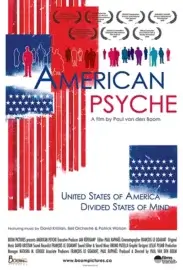Enjoy a free preview via Film Discovery! Click here !
Enjoy a free preview via Film Discovery! Click here !
Enjoy a free preview via Film Discovery! Click here !
Enjoy a free preview via Film Discovery! Click here !

https://www.filmplatform.net/product/american-psyche
AMERICAN PSYCHE explores the every-day American perspective on social and political life in America following the events of 9/11.
Travelling from New York City to Los Angeles, two European filmmakers conduct a series of interviews with Americans of diverse race, gender, religion and socio-economic standing. As they travel across America, listening to the stories of every-day people, they explore the current climate of social and political life in the United States.

The events of 9/11 marked a fundamental shift in the way America saw itself in relation to the rest of the world. As the White House expanded its vocabulary in ‘preemptive strikes’ and ‘homeland security’, even the idea of ‘America’ changed. What being ‘American’ meant, was appropriated into the unilateral interests of the Bush administration, creating an ‘us or them’ mantra. Sound-bites and vox-pop quotes saturated news media outlets, polarizing the country and making complex issues a yes or no veto on terrorism. The Bush administration’s actions were re-branded as the ‘American way’ and a divine demonstration of freedom and democracy. Internationalism and responsibility to the United Nations was abandoned in the name of ‘self-determination.’ Unilateral coalitions were used instead, framing the United States as an absolute force of decisive action. Democracy became an American product that could be exported to foreign countries through military intervention. Ironically, at the same time Democracy was being used to ‘enlighten’ foreign nations, domestic policies in democracy were being compromised by ‘homeland security.’ The ‘war on terror’ became an absolute rationale; an excuse for abandoning basic human rights and dismissing the sovereignty of foreign nations.
As these events continued to press on the international conscience, I began to question what the true social climate of the United States was, and whether the actions of the White House were really re ecting the interests and concerns of its people. As a European, living in Canada, I became increasingly frustrated by the media sound-bites available to me. Having worked and travelled in the United States, I had experienced rst hand the generosity of
its people. However I could not align those experiences, with the ‘American way’ outlined by news headlines and the White House podium. Consequently I, along with François Le Goarant, decided to seek out the voices of every-day Americans directly. We wanted
to engage people rst-hand, and ask them to re ect on their current social and political climate; ask them what they thought about the direction the country was taking and their hopes for the future. We wanted to give people an opportunity to speak for themselves, and not through the lters of panelists, and political specialists.
With this goal in mind ‘American Psyche’ was born. François and I began a cross country road-trip from New York to Los Angeles, interviewing close to 150 Americans, from a variety of social, political and religious backgrounds. In truth, only two interviews were planned ahead. All other interviewees were met by simply striking up a conversation with those around us: locals on the street, in restaurants, markets, or even live stock auctions. More often than not we were invited into their homes, to stay for dinner and sleep in their guest room. With the tight reign of ‘homeland security’ in place, we expected Americans to be more suspicious of interviews, and less welcoming to strangers. However, we were able to easily connected with local people, showing Americans in general to be a welcoming and generous people.
Throughout the lming process we worked from a loose framework of questions and topics as a way to start conversation. During our travels particular themes came into focus, revolving around 9/11, the invasion of Iraq and the Bush Administration: International relations and responsibility; national security & control; human rights and social responsibilities. Finally
the tried and true topics of money, religion, ‘democracy now’ and the future of America emerged again and again. Through engaging in candid conversations, we found a rhythm of understanding within the every-day American landscape, that opened up a dialogue of healthy criticism and self-reflection.
Ultimately through the editing process, Paul Raphaël and I found a momentum that allowed the many layers and perspectives of this dialogue to intermingle. This was accomplished through interchanging the dialogue from multiple interviews according to their themes.
By approaching the lm in such a way, we hoped to encourage the audience to draw relationships between multiple perspectives of thought, rather then isolating each interviewee and their opinions, according to their identity, location and lifestyle. Ultimately we hoped to foreground the active interest Americans had for their national identity, and its role in the international arena. While providing no clear conclusions, we hoped to provoke further discussion in our audiences, through the questions posed and explored by the Americans in our film.
With the creation of American Psyche, I hoped to make a deeply relevant lm that would speak to audiences on an international level. From the beginning, while this lm held a political purpose, we did not want to make it overly polemic; a lm which gave the viewer an opportunity to draw their own conclusions, and nd a place for their own opinions within the varied responses of our interviews. While there remain issues and topics that inspire polemic stances, it is within the very human concerns and hopes for their future, that these people express the overlap of their American values.
Ultimately I hope to offer an alternative portrayal of the big ‘A’ American portrayed in mass media, and provide an insight onto the diverse people whose government was leading the so-called ‘war on terror.’ The lm also calls into question many of the myths about Americans that have established themselves in both the journalistic and international consciousness. Through each participant’s willingness to share and converse with our cameras, we found that potential for the true expression of freedom in Democracy: the ability to challenge and question the decisions of their own government and nation.
Paul van den Boom
Producer and Director of American Psyche
SELECTED CHARACTER DESCRIPTIONS
Ida Lewis
Ida has been working in journalism for over 50 years. She has written for newspapers and periodicals like Life Magazine, L’Express, The Washington Post and The New York Times. In 1971 Ida became the rst black woman in the U.S. to publish a magazine, with the founding and publication of “Encore: American & Worldwide News.” She has worked as its publisher and editor-in-chief for 10 years. Currently Ida is a professor at Boston University within the Department of Journalism.
Peter Koper
Peter has been a writer/producer in television and lm for over two decades. Peter also teaches writing at Columbia University in New York State. We met Peter for an interview in his SoHo loft apartment in New York City. His observations on the United States are also informed by his background as a newspaper reporter and foreign correspondent.
Ray Hudson
Ray started his career working in the insurance business. After a while he felt a need to give more meaning to his life. Ray went on to become a Reverend and now leads an active church community at the Real Life Methodist Church in Waterloo, Illinois.
Wally Brown
Wally is a longtime Navajo educator & activist in Page, Arizona. Wally has built a Navajo Village Heritage Center, where visitors learn about the culture, traditions and spirit of Navajo Native Americans. Wally shared his wisdom with us, giving an insight into the different outlook Native Americans have on the world.
Mahnaz M. Shabbir
Mahnaz is a first generation American Muslim woman, who has a successful career, in addition to raising her family in Stilwell, Kansas. Mahnaz and her parents emmigrated
from India to the United States in the 1950s. Mahnaz is president of her own strategic management consulting company. She also lectures to organizations and the government who are interested in knowing more about Islam and diversity. Mahnaz is a leader amongst the Muslim community in the greater Kansas City area.
Steven E. Clutter
We met Steven, his wife and their ten children at the open-air auction in Mount Hope, Ohio. Mount Hope is home to mostly Amish and Christian families. Steven and his family were singing religious songs “to share the love of Jesus and spread some seeds”. Steven is a devoted Born Again Christian who works as an Internal Medicine Doctor.
Alfred G. Davis Jr.
We met Alfred in front of the Salvation Army in North Las Vegas. After Alfred was released from a mental health hospital, he was separated from his wife, lost his house and his job, and subsequently ended up living on the street. Alfred discussed many of the challenges a person faces on the streets and his observations on American society.
Rene Doria
Rene was born in the slums of Manila, in the Philippines. When Rene was 18 years old his family was visited by missionaries from the Church of Jesus Christ of Latter-day Saints. His family converted to the Mormon religion. After Rene met his wife they moved to the United States. Rene received a degree in Statistics and works for an investment company in Salt Lake City. Rene has 7 children.
Billy Gale
Billy had just parked his Cadillac Eldorado in front of a beach in Malibu, preparing to go surfing. Billy shared many stories involving his experiences while on the road. In pursuit of his two passions, music and surfing, he had seen much of America and laid out his insights with the measured skill of a songwriter.
Clare Martin
Clare is a man in his eighties with a great interest in the world around him. We met him in a local coffee house in Berlin, Ohio. Before retirement Clare was a social studies teacher at the local high school. Clare is a self-taught intellectual, referred to in his home town as “the walking encyclopedia.”
Malachi Watkins
Malachi, eighteen years old, had just returned to his home town of Prairie Village, Kansas, after a one-year road trip through the United States. While driving through the country and sleeping in his van, he met many Americans from all walks of life. Because of the poverty and injustice that he saw around him, Malachi now looks at his country in a different way.